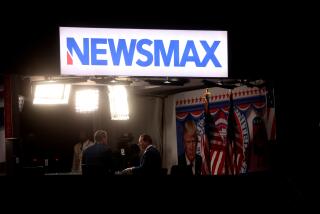News Corp. Shares Fall as Bid Fails
- Share via
After two decades of painstakingly piecing together a global satellite network, News Corp. Chairman Rupert Murdoch walked away from the last and most crucial piece of his dream: buying General Motors Corp.’s Hughes Electronics Corp. and its DirecTV unit.
But the setback may simply mark a break in the action, not the conclusion of the game.
For starters, significant federal regulatory hurdles remain for Murdoch rival EchoStar Communications Corp., whose $26.5-billion acquisition of Hughes would make it the single U.S. satellite television provider.
“The jury is still out on whether this is the end of the line [for this deal] for News Corp. There will be a lot of scrutiny of this deal,” said Larry Gerbrandt, a senior analyst with Kagan World Media.
Still, News Corp. investors longed for what might have been, sending the company’s U.S. listed-shares down 6.2%, or $1.80, to $27.25 in New York Stock Exchange trading Monday.
Murdoch, who was personally involved in the 18-month-long negotiations, had planned to add DirecTV to his Sky Global Network, the largest satellite TV provider outside of the U.S., with services in Britain, Asia and parts of Latin America. The deal would have left EchoStar as a competitor across the country, alleviating regulatory concerns.
“Hughes would be a watershed deal for News Corp.,” Peter Shorthouse, a key News Corp. analyst with Australia’s ABN Amro, wrote Sunday.
Without it, News Corp. would lose its “ability to differentiate itself from Disney, Viacom and Vivendi and [to] look more like AOL Time Warner by integrating content and broadband distribution. Furthermore, the potential for growing new U.S. cable networks could be hampered by issues of access to others’ distribution systems.”
As a result, Australia-based News Corp. will continue to be dependent on cable television system operators to distribute its programming. Through DirecTV, News Corp. had planned to launch new services such as pay-per-view events and movies as well as video on demand, Gerbrandt said.
“It’s a disappointment from a strategic point of view,” said Merrill Lynch analyst Jessica Reif Cohen. Sky Global Networks would have been “a unique asset....The potential was great, but it was never clear what they would have to go through” to make it work.
Murdoch had been prepared to spin off Sky Global Networks as a separately traded company controlled by News Corp.
Losing Hughes “makes Sky Global less attractive,” said Gerbrandt. “If he could offer a worldwide service, Murdoch could have done some things he can’t do now.”
News Corp. is hardly out of the game. In July, the company completed its $4.4-billion acquisition of rival broadcaster Chris-Craft Industries Inc., making its Fox television group the most powerful in the nation. News Corp. continues to be a major American broadcaster and movie and TV studio and to operate Fox News, Fox Sports Net, and FX cable channels.
The stock will rebound, analysts said. “They don’t need to do the deal,” said media analyst Jack Myers.
Haim Saban, former chief executive of Fox Family Worldwide, which News Corp. sold last week to Walt Disney Co. for $2.9 billion, said it would be a mistake to count Murdoch out.
“DirecTV [would be] a wonderful, wonderful deal for the consumers of News Corp.,” said Saban. “But to quote my friend Rupert Murdoch, think of News Corp. as the Louvre. News Corp. now is the Louvre without the Mona Lisa. There is only one Mona Lisa, but there are many other wonderful pieces to take its place.”
More to Read
The biggest entertainment stories
Get our big stories about Hollywood, film, television, music, arts, culture and more right in your inbox as soon as they publish.
You may occasionally receive promotional content from the Los Angeles Times.










